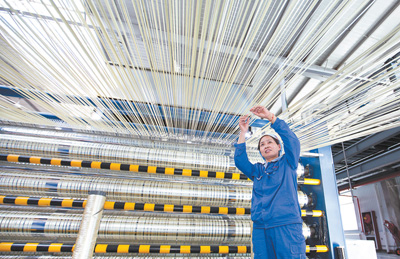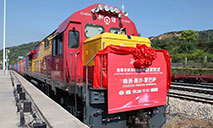China’s new materials industry holds great potential for growth
The total output value of China’s new materials industry is expected to hit 10 trillion yuan (about $1.5 trillion) by 2025, indicating broad prospects for the sector’s future development.

Photo shows an employee working at the carbon fiber production base of Zhongfu Shenying Carbon Fiber Co., Ltd.’s Xining branch in Xining, northwest China’s Qinghai province. (Photo/He Yingli)
The industry’s output value increased from 0.8 trillion yuan in 2011 to 4.5 trillion yuan in 2019, with the average compound annual growth rate surpassing 20 percent.
“The new materials industry is ushering in a higher stage of well-adjusted balance where demand drives supply and supply, in turn, creates demand,” said Zhou Yuxian, chairman of the China National Building Material Group Co., Ltd. (CNBM), a leading developer of new materials in the world.
This year, China’s growing high-tech industries have driven the growth of demand for new materials, and the continued upgrading of the new material industry has expanded applications for new materials, Zhao added.
“In the first half of this year, the share of our new materials business’ revenue increased to 23 percent from 19 percent at the end of last year, while that of net profit grew to 41 percent from 36 percent,” Zhou noted.
Zhongfu Shenying Carbon Fiber Co., Ltd., a company that produces carbon fibers, which are strong and with high temperature, corrosion and fatigue resistance, and widely used in strategic emerging industries like the aerospace industry, serves as a vivid example of China’s thriving new materials industry. On Sept. 8, the company put into operation its carbon fiber production base with an overall capacity of 25,000 tonnes, the first of its kind in the country, in Xining, northwest China’s Qinghai province. The operation of the base will meet China’s growing demand for carbon fibers, which registered an average annual growth rate of more than 13 percent since 2014.
“The operation marked that our company could design a production line with a capacity of producing 3,000 tonnes of high-performance carbon fibers annually and master a complete set of independent technologies,” said Lian Feng, deputy general manager of the company’s Xining branch.
The products of Zhongfu Shenying, also a subsidiary of CNBM, are much sought-after by clients. “The order volume for our carbon fibers this year is expected to be three times that of last year,” Lian added.
Apart from tapping into a massive market, the company’s success also lies in its huge investments into research and development. Over the past 10 years, it has invested over 2 billion yuan in this regard. By pooling together its research teams to develop T1100 high-performance carbon fiber composite, the company is striving to build an experimental production line by the end of this year.
“Now is the best time for domestic carbon fiber enterprises to catch up with their international competitors,” Lian said, adding that Chinese companies need to introduce carbon fibers and advanced composite products with high added value to fill a gap in the high-end market and enhance their core competitiveness.
Similarly, Sinoma Advanced Nitride Ceramics Co., Ltd., another new materials company affiliated with CNBM, is now able to export its high-quality silicon nitride ceramic balls made with advanced hot isostatic pressing (HIP) technology. In the first eight months of this year, the company’s exports of silicon nitride ceramic balls soared 303 percent from the same period last year. It has become the third company in the world to apply the HIP technology to massively produce the products following America’s CoorsTek and Japan’s Toshiba.
In July, CNBM initiated a 15-billion-yuan investment fund for the new materials industry, which will facilitate the sector’s future development.
In the following five years, CNBM will continue to develop and mass produce high-end new materials, and accelerate progress in achieving breakthroughs for core technologies in key fields, so as to help China develop industrial and supply chains that are self-supporting and controllable, Zhou Yuxian said.
Photos
Related Stories
Copyright © 2021 People's Daily Online. All Rights Reserved.










